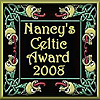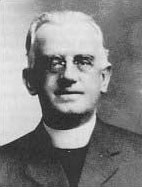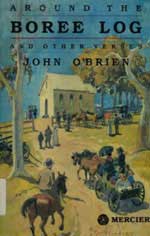| |

Traditions, folklore, history and more. If it's Irish, it's here. Or will be!
"People will not look forward to posterity who never look backward to their ancestors."
-Edmund Burke




Quotes
Library: Books, Movies, Music
Prints & Photos
Poetry
Jokes


Shops Ireland
Bunús na Gaeilge
(Basic Irish)
Circle of Prayer
Blessings
Did You Know?
Himself/Herself
Write to Us
Readers Write..
Links/Link to Us
Advertise with us
Awards & Testimonials
Submissions Guide


|
|
|
The Rosary and all the Trimmings
by Bridget Haggerty

My mother, God bless her - RIP - was one of the most devout women I have ever known. She went to Mass every day and she made certain that her children went to Mass every Sunday. That was back in the 1950s. Did she ever call us before bedtime to pray the Rosary? Honestly, if she had, I would have remembered it. But, I am certain that when she was growing up in Ireland long ago, her mother - as with most Irish mothers back then - right before bedtime, would have beckoned all the children to bring their beads and gather around the hearth
Every Thanksgiving in the United States, I have to wonder when I hear phrases such as 'Turkey and all the Trimmings.' Trimmings in old Ireland were the prayers added on to the Rosary evening ritual. Research into the Rosary and 'Trimmings' rewarded this writer with a connection to one Father Hartigan.
He was born at O'Connell Town, Yass, New South Wales on 13th October 1878. His parents came from Lisseycasey, County Clare, Ireland. and he was the fourth of nine children. He was ordained in 1908 and in 1916 he was appointed Parish priest of Barrigan. Here he wrote one of his earliest poems, "The Parting Rosary" concerning a young local lad who was killed in the Great War during August,1916.
He was one of the first curates in the region to own a motor car. It's said that in 1914, he took the last rites to Jack Riley of Bringenbong - The Man From Snowy River.
 His first poetry was published in local journals from 1906 and in 1921, believing that his poems were of no merit, Father Hartigan, produced 'Around the Boree Log and other Verses' under the pseudonym of John O'Brien. His first poetry was published in local journals from 1906 and in 1921, believing that his poems were of no merit, Father Hartigan, produced 'Around the Boree Log and other Verses' under the pseudonym of John O'Brien.
Father Hartigan passed from this world in 1952. He was Australian of Irish descent and in the following poem, you'll grasp far better than this writer could ever convey, the tradition of gathering the "childer" to say the rosary.
Trimmings Of The Rosary
Ah, the memories that find me now my hair is turning gray,
Drifting in like painted butterflies from paddocks far away;
Dripping dainty wings in fancy-and the pictures, fading fast,
Stand again in rose and purple in the album of the past.
There's the old slab dwelling dreaming by the wistful, watchful trees,
Where the coolabahs are listening to the stories of the breeze;
There's a homely welcome beaming from its big, bright friendly eyes,
With the Sugarloaf behind it blackened in against the skies;
There's the same dear happy circle round the boree's cheery blaze
With a little Irish Mother telling tales of other days.
She had one sweet, holy custom which I never can forget,
And a gentle benediction crowns her memory for it yet;
I can see that little mother still and hear her as she pleads,
"Now it's getting on to bed-time; all you childer get your beads."
There were no steel-bound conventions in that old slab dwelling free;
Only this-each night she lined us up to say the Rosary;
E'en the stranger there, who stayed the night upon his journey, knew
He must join the little circle, ay, and take his decade too.
I believe she darkly plotted, when a sinner hove in sight
Who was known to say no prayer at all, to make him stay the night.
Then we'd softly gather round her, and we'd speak in accents low,
And pray like Sainted Dominic so many years ago;
And the little Irish mother's face was radiant, for she knew
That "where two or three are gathered" He is gathered with them too.
O'er the paters and the aves how her reverent head would bend!
How she'd kiss the cross devoutly when she counted to the end!
And the visitor would rise at once, and brush his knees-and then
He'd look very, very foolish as he took the boards again.
She had other prayers to keep him. They were long, long prayers in truth;
And we used to call them "Trimmin's" in my disrespectful youth.
She would pray for kith and kin, and all the friends she'd ever known,
Yes, and everyone of us could boast a "trimmin'" all his own.
She would pray for all our little needs, and every shade of care
That might darken o'er The Sugarloaf, she'd meet it with a prayer.
She would pray for this one's "sore complaint,' or that one's "hurled hand,"
Or that someone else might make a deal and get "that bit of land";
Or that Dad might sell the cattle well, and season's good might rule,
So that little John, the weakly one, might go away to school.
There were trimmin's, too, that came and went but ne'er she closed without
Adding one for something special "none of you must speak about."
Gentle was that little mother, and her wit would sparkle free,
But she'd murder him who looked around while at the Rosary:
And if perchance you lost your beads, disaster waited you,
For the only one she'd pardon was "himself"-because she knew
He was hopeless, and 'twas sinful what excuses he'd invent,
So she let him have his fingers, and he cracked them as he went,
And, bedad, he wasn't certain if he'd counted five or ten,
Yet he'd face the crisis bravely, and would start around again;
But she tallied all the decades, and she'd block him on the spot,
With a "Glory, Daddah, Glory!" and he'd "Glory" like a shot.
She would portion out the decades to the company at large;
But when she reached the trimmin's she would put herself in charge;
And it oft was cause for wonder how she never once forgot,
But could keep them in their order till she went right through the lot.
For that little Irish mother's prayers embraced the country wide;
If a neighbour met with trouble, or was taken ill, or died,
We could count upon a trimmin'-till, in fact, it got that way
That the Rosary was but trimmin's to the trimmin's we would say.
Then "himself" would start keownrawning-for the public good, we thought-
"Sure you'll have us here till mornin'. Yerra, cut them trimmin's short!"
But she'd take him very gently, till he softened by degrees-
"Well, then, let us get it over. Come now, all hands to their knees."
So the little Irish mother kept her trimmin's to the last,
Ever growing as the shadows o'er the old selection passed;
And she lit our drab existence with her simple faith and love,
And I know the angels lingered near to bear her prayers above,
For her children trod the path she trod, nor did they later spurn
To impress her wholesome maxims on their children in their turn.
Ay, and every "sore complaint" came right, and every "hurled hand";
And we made a deal from time to time, and got "that bit of land";
And Dad did sell the cattle well; and little John, her pride,
Was he who said the Mass in black the morning that she died;
So her gentle spirit triumphed-for 'twas this, without a doubt,
Was the very special trimmin' that she kept so dark about.
But the years have crowded past us, and the fledglings all have flown,
And the nest beneath The Sugarloaf no longer is their own;
For a hand has written "finis" and the book is closed for good-
There's a stately red-tiled mansion where the old slab dwelling stood;
There the stranger has her "evenings," and the formal supper's spread,
But I wonder has she "trimmin's" now, or is the Rosary said?
Ah, those little Irish mothers passing from us one by one!
Who will write the noble story of the good that they have done ?
All their children may be scattered, and their fortunes windwards hurled,
But the Trimmin's on the Rosary will bless them round the world.
Note: If you would like to read other poems by Fr. Hartigan, you'll find a great collection in "Around the Boree Log" which is available from Amazon.
Reader's Comments:
I smiled to read your story of Fr. Hartigan and his stories "Around the
Boree Log". I came from across the river from Lisseycasey but now live in Australia. Fr. Hartigan told the story himself of his trip to Ireland and his "return"to Lisseycasey, as some called it.
On arrival he enquired if any there remembered or knew of his family who hademigrated to Australia. Some people said there was an old man lived up the hill who might remember his father, so he went there. "My name is Father Hartigan" he said, "and my father came from here. Would you remember him?".
The old man took the dudeen from his mouth and eyed him carefully for a few
minutes then replied very slowly "Indeed I do" he said "Tell me, did that
fella ever marry?".
Fair deuce to him, he thought this was the funniest thing he ever heard!
Paul Scroope
|
|
Fri, Sep 27, 2024
 The Galway Hooker The Galway Hooker
This unique vessel, with its distinctive curved lines and bright red sails, originated in the village of Claddagh. During the 19th century, hookers supported a significant fishing industry and also carried goods, livestock and fuel. Seán Rainey is remembered for building the last of the original boats, the Truelight, for Martin Oliver who was to become the last king of the Claddagh; as king, he was entitled to white sails on his boat. Since the mid seventies, many of the old sailing craft which were on the verge of extinction have been lovingly restored and new ones have been built. During the summer months they can be seen at festivals such a Cruinniú na mBád - the Gathering of the Boats - in Kinvara.
Click for More Culture Corner.
|




 The Galway Hooker
The Galway Hooker